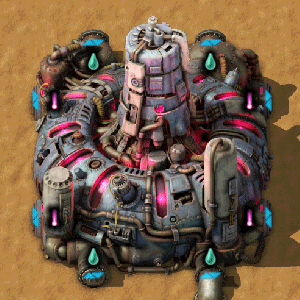Fusion reactor
| Fusion reactor |
|
Recipe |
|||||||||||||
| +++ → | |||||||||||||
|
Total raw |
|||||||||||||
| +++ | |||||||||||||
|
Map color |
|||||||||||||
|
Health |
|
||||||||||||
|
Resistances |
Fire: 0/70% |
||||||||||||
|
Stack size |
1 |
||||||||||||
|
1 |
|||||||||||||
|
Dimensions |
6×6 |
||||||||||||
|
Energy consumption |
|
||||||||||||
|
Drain |
10MW (electric) |
||||||||||||
|
Heat output |
|
||||||||||||
|
Fluid consumption |
|
||||||||||||
|
Mining time |
0.2 |
||||||||||||
|
Prototype type |
|||||||||||||
|
Internal name |
fusion-reactor |
||||||||||||
|
Required technologies |
|||||||||||||
|
Produced by |
|||||||||||||
|
Valid fuel |
|||||||||||||
Object description
![]() Space Age expansion exclusive feature.
Space Age expansion exclusive feature.
The fusion reactor generates plasma![]() from fusion power cells
from fusion power cells![]() , fluoroketone (cold)
, fluoroketone (cold)![]() , and electricity. The plasma can be used in a fusion generator
, and electricity. The plasma can be used in a fusion generator![]() to generate power. Unlike the nuclear reactor, a fusion fuel cell usage scales with the plasma output, so no energy is lost. At full power draw, a single fusion power cell will be consumed in 400 seconds. A single reactor can output 100 MW worth of plasma.
to generate power. Unlike the nuclear reactor, a fusion fuel cell usage scales with the plasma output, so no energy is lost. At full power draw, a single fusion power cell will be consumed in 400 seconds. A single reactor can output 100 MW worth of plasma.
A reactor requires 10 MW of power to generate plasma. As such, starting a reactor setup requires some external power, but once plasma is in the generators, the reactor setup can power itself.
Fluoroketone is not permanently consumed by a fusion reactor setup; it is used as a coolant. The coolant is (effectively) converted into an equal amount of plasma by the reactor, and the generator produces hot fluoroketone based on how much plasma the generator consumes, so any cold fluoroketone consumed by a reactor will be regenerated by the generator. To keep the loop going, a cryogenic plant must cool the hot fluoroketone back to cold before recirculating it into the reactor.
Each reactor consumes at most 4 cold fluoroketone per second. Assuming no modules are used, 1 cryogenic plant can cool enough fluoroketone for one reactor.
Neighbour bonus
Like nuclear reactors, fusion reactors receive a bonus for adjacent operating reactors, which increases the energy potential of the generated plasma by 100% per linked reactor. Fusion reactors differ in that the bonus only requires an adjacent reactor to share one fluid connection rather than three heat connections; connecting two outputs to the same reactor grants no additional benefit. Reactors have 2 fluid connections on each side, so the highest bonus a reactor can practically receive (while still leaving room to insert fusion power cells) is +500%.
Unlike other power generators, the heat of the plasma generated is variable and is determined by the reactor's neighbour bonus. With no bonus, the plasma generated is at 1 million °C. With a 100% bonus, the plasma generated is at 2 million °C, and so on. Different reactors in an array can generate plasma at different temperatures, with the temperatures averaging out within the plasma fluid system. Fusion generators will generate power based on the heat of the plasma they are consuming, up to their maximum of 50 MW each.
The amount of cold fluoroketone consumed by the reactor to generate power does not change with the neighbour bonus - it will always be 4/s (modified by quality). Two separate reactors will consume the same amount of cold fluoroketone per second at max power draw as two adjacent reactors with a neighbour bonus. Larger arrays of reactors and generators will require more fluoroketone to exist in the system, simply because there are more fluid pipes for the coolant and plasma to go through, but they do not require constantly adding more to the system.
Achievements

|
Fusion power Start producing electric power by fusion powerplant. |
